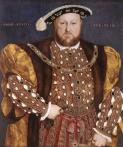 Close Topic Options
Close Topic OptionsHenry Viii
Henry Viii - Politics, Business, Civil, History - Posted: 8th Feb, 2005 - 1:03pm
Henry Viii
Henry VIII, the king of England, is a true hollywood star. His storry could be added to the MTV series of star's love lifes. This king had an astounding number of wifes - some beheaded, some divorced.
| QUOTE |
| Henry, determined to provide a male heir to the throne, decided to divorce Katharine and marry Anne Boleyn. English diplomacy became a series of maneuvers to win the approval of Pope Clement VII, who was in the power of emperor Charles V, Katharine's nephew. The king wished to invalidate the marriage on the grounds that the papal dispensation under which he and Katharine had been permitted to marry was illegal. The pope reluctantly authorized a commission consisting of cardinals Wolsey and Campeggio to decide the issue in England. Katharine denied the jurisdiction of the court, and before a decision could be reached, Clement had the hearing adjourned (1529) to Rome. The failure of the commission, followed by a reconciliation between Charles and Francis I, led to the fall of Wolsey and to the initiation by Henry of an anti-ecclesiastical policy intended to force the pope's assent to the divorce. Under the guidance of the king's new minister, Thomas Cromwell, the anticlerical Parliament drew up (1532) the Supplication Against the Ordinaries, a long list of grievances against the church. In a document known as the Submission of the Clergy, the convocation of the English church accepted Henry's claim that all ecclesiastical legislation was subject to royal approval. Acts stopping the payment of annates to Rome and forbidding appeals to the pope followed. The pope still refused to give way on the divorce issue, but he did agree to the appointment (1533) of the king's nominee, Thomas Cranmer, as archbishop of Canterbury. Cranmer immediately pronounced Henry's marriage with Katharine invalid and crowned Anne (already secretly married to Henry) queen, and the pope excommunicated Henry. In 1534 the breach with Rome was completed by the Act of Supremacy, which made the king head of the Church of England (see England, Church of). Any effective opposition was suppressed by the Act of Succession entailing the crown on Henry's heirs by Anne, by an extensive and severe Act of Treason, and by the strict administration of the oath of supremacy. A number of prominent churchmen and laymen, including former chancellor Sir Thomas More, were executed, thus changing Henry's legacy from one of enlightenment to one of bloody suppression. Under Cromwell's supervision, a visitation of the monasteries in 1535 led to an act of Parliament in 1536 by which smaller monasteries reverted to the crown, and the others were confiscated within the next few years. By distributing some of this property among the landed gentry, Henry acquired the loyalty of a large and influential group. |
International Level: Activist / Political Participation: 29 ![]()
![]()
![]() 2.9%
2.9%
Viii Henry
There is quite a large following of the Church of England in Britain and out of 10 I would say only 2 or 3 really acknowledge this story of how the Church started - the Church of England that is - because a king wanted a divorce. Now the two sides (Roman Catholics and the Church of England argue over trifle things).
In the link below is some objective comments on what Henry did and how he may have reacted to all this history on him:
Ref. https://www.pbs.org/wnet/sixwives/about/beh...t_starkey2.html

Henry Viii (Hover)
International Level: International Guru / Political Participation: 3231 ![]()
![]()
![]() 100%
100%
 TOPIC: Henry Viii
TOPIC: Henry Viii